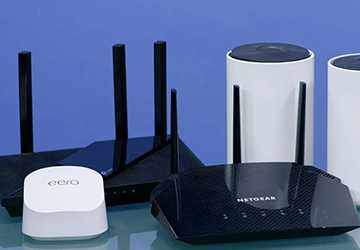How to Choose the Best Router for Your Needs
Author: sana
A good router is a crucial component in today's world, where the Internet is necessary. However, many customers complain about low speeds, constant disconnections, and coverage issues because of poor routers.
A router to be selected is essential since it determines the kind of signal to be produced by this router.

This blog post will share must-know tips that help you choose the most appropriate router. Learn how to get a router to enhance your internet experience and eliminate buffering.
Let’s explore the best router!
The Importance of a Good Router
It is essential to have a high-quality router, the core of your home network, that can provide fast and stable connections.
It helps ensure you have internet connectivity on all your devices and that it is fast and stable.
Routers are also necessary when looking at ways of enhancing your internet speed and connection.
Streaming, gaming, and browsing are no longer annoying with an unbroken signal fed to the device.
However, a stable router is essential for working from home.
It means you can maintain interaction with coworkers, participate in online meetings, and use cloud-based data without disruptions.
As technology advances, a quality router is not a luxurious item but a necessity for most people in today's society.
It yields returns regarding efficiency, demand for entertainment, and general web use.
Upgrade your internet experience by investing in a router rather than buying a substandard device that confines your internet capabilities.
It is now time to get a better device that meets your current demands and can deliver the performance you are entitled to.
Key Factors to Consider When Choosing a Router
Now that you understand why a good router is essential for your needs, let's explore some points you must consider when setting up a router system.
1. Speed and Performance
Router speed and performance are responsible for a user's internet experience. Select routers with high bandwidth, such as AC1200 or AC1900, for faster connectivity and an uninterrupted internet connection.
The new routers have dual-band or tri-band frequencies to segregate the different bands for each device to avoid crowding and interference.
Higher speed ratings enable multiple devices to use the Internet simultaneously without lag or buffering.
Purchasing a router that performs better in speed and capability provides smooth streaming, gaming, and browsing for all connected devices.
2. Coverage Area
The coverage area defines signal strength and the area in which the router can provide a stable Wi-Fi signal. This is particularly important for the size of your home or office, as it determines the type of router you should purchase.
Another feature is to look for routers that have good signal strength and range to ensure that access is possible in every corner of the home.
Recent technological developments like beamforming and multi-user multiple input multiple outputs (MU-MIMO) assist in expanding coverage and reducing areas of poor signal reception.
Mobility minimizes areas with poor signals and ensures consistent connectivity throughout your space.
3. Security Features
It is crucial for any network today to be protected against hacking and cyber-attacks. Security should be given a high priority to ensure that the data transmitted and received by the router is safe and secure.
Check that the routers support the newest WPA3 encryption to ensure better security from intruders.
Additional facilities such as guest networks and parental control are also beneficial and ensure security.
Security on routers protects your information and guarantees the safety of the connection for all users.
4. Ease of Use and Setup
The intuitive mobile applications and web interfaces make router management easy and stress-free. Select devices that are easy to install and configure on your network.
Most of these tools are designed for easy installation, and additional guided wizards are provided to help those who lack basic knowledge of computer operations.

With simple interfaces for setup and configuration, routers provide faster and easier setup while still enabling fine control over the network.
5. Price and Value
Learn when matching a router to its price range is most suitable. Make comparisons based on the devices' features and performance levels within various price bands.
Through self-assessment of price and value, one can make the right decision to meet the intended performance standards at an affordable cost.
6. Additional Features
In addition to the primary capabilities, additional functionality can help improve your networking process.
Consider these when making your selection:
● USB ports can share printers or external storage devices to your network.
● MU-MIMO technology enables the routers to communicate with more than one device at a time, thus enhancing general performance.
● In Quality of Service (QoS) settings, available bandwidth is reserved for the most critical applications. It has smart home integration to connect with other smart home devices and IoT compatibility for easy integration of the connected ecosystem.
These extra router options give you more control and allow you to use your network as you want.
Upgrade to the Best Router Today!
Choosing the right router is a pivotal decision that can significantly influence the internet connection.
When choosing a device, attributes such as speed, coverage, security, usability, cost, and extra features are essential. These ensure you get the best device on the market if well chosen.
Why continue to use a regular router that does not provide the whole internet experience? Get involved now and unleash the full potential of your internet connection.
An excellent router can make an enormous difference if you are a home office worker, an online movie or series binger, or even an online gamer.
Begin your journey to find the perfect router for your home or office today and experience what a good and reliable router can bring to your everyday life.
Frequently Asked Questions
Q. What are the fundamental differences between a dual-band and a tri-band router regarding wireless signal bands or frequencies?
Ans. There are two types of routers: dual-band routers that support the 2.4 GHz and 5 GHz bands and tri-band routers that support three bands, namely 2.4 GHz and two 5 GHz bands. The tri-band routers are very useful for large families with numerous connecting devices because they prevent traffic and enhance speed.
Q. How can I enhance Wi-Fi in my home?
Ans. For better Wi-Fi coverage, get routers with a powerful signal or signal that can reach as far as possible. Mount the router and position it as centrally as possible with no obstacles. Mesh Wi-Fi systems can also be helpful to address dead zones and extend coverage.
Q. What are some of the most important things I should know about routers regarding security?
Ans. Choosing routers with WPA3 security is preferable, as it is the latest security protocol. Other protection features include guest networks, parental control, and firewalls. It is also important to note that firmware updates are regularly made to enhance the security aspects of the devices.





